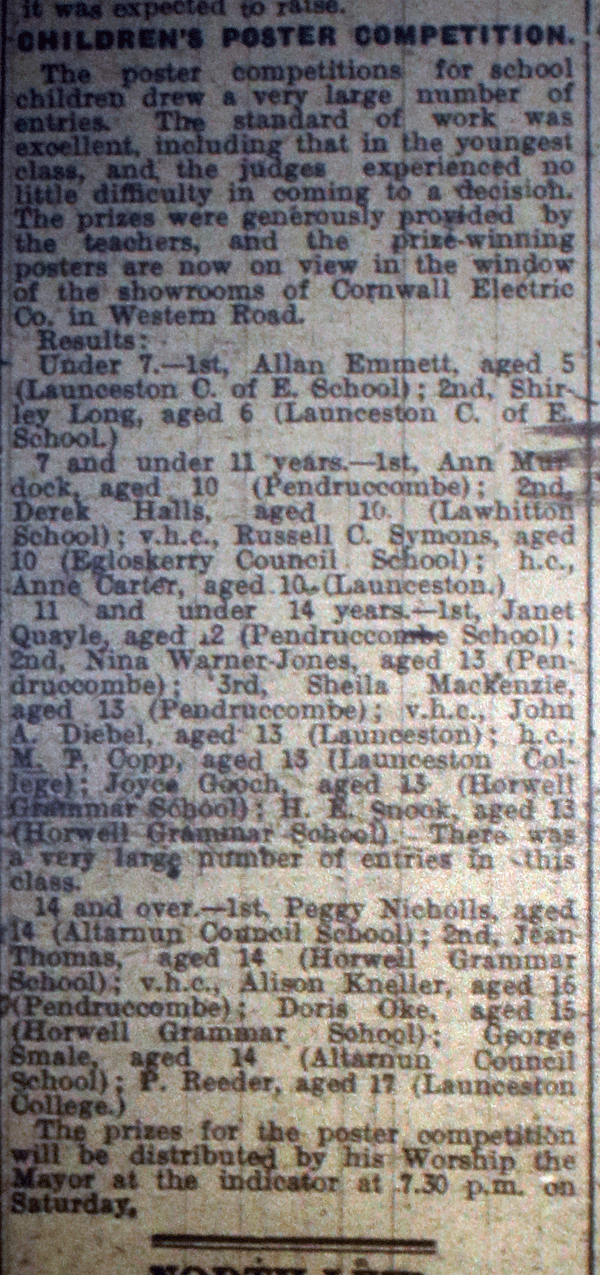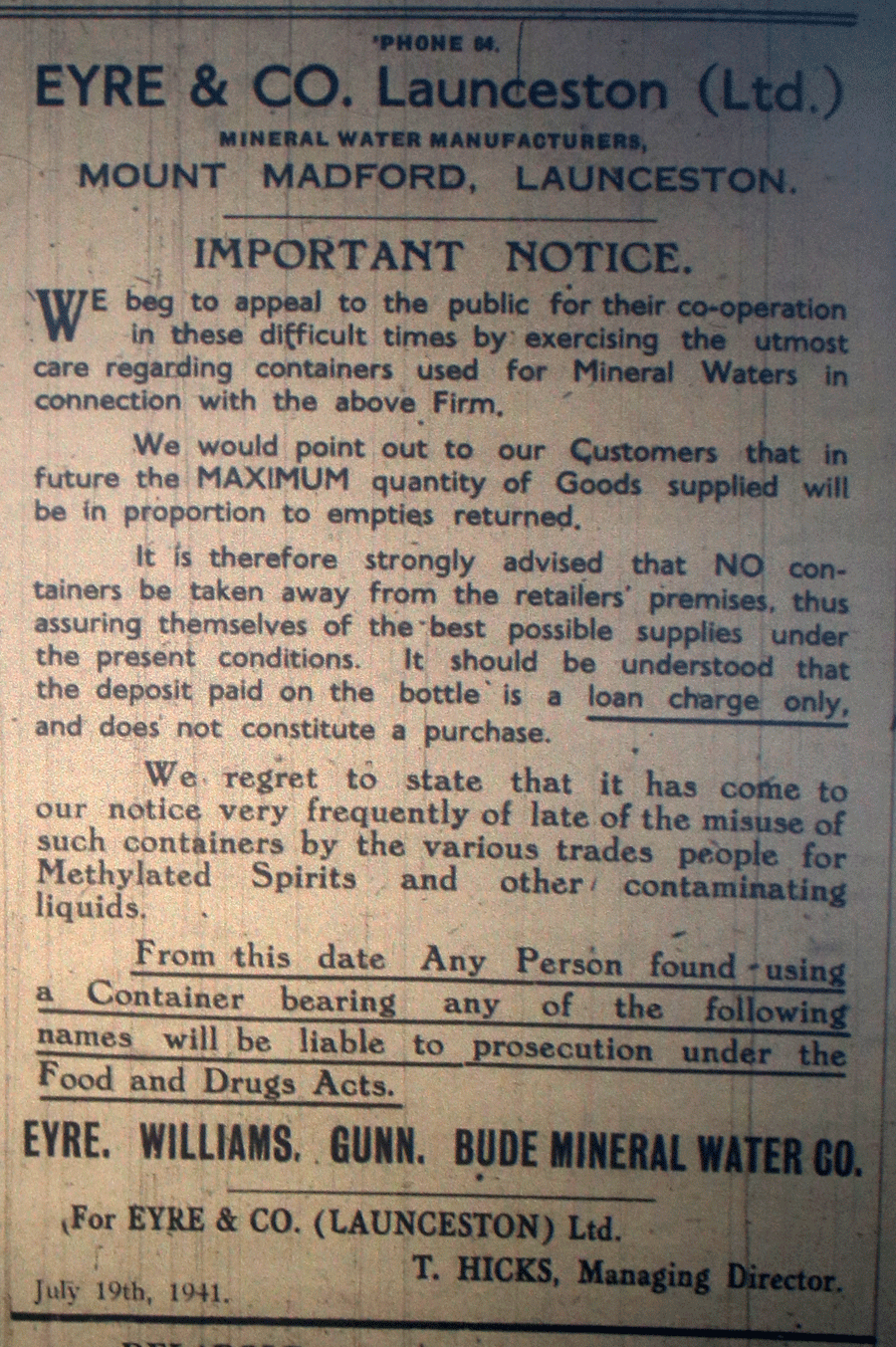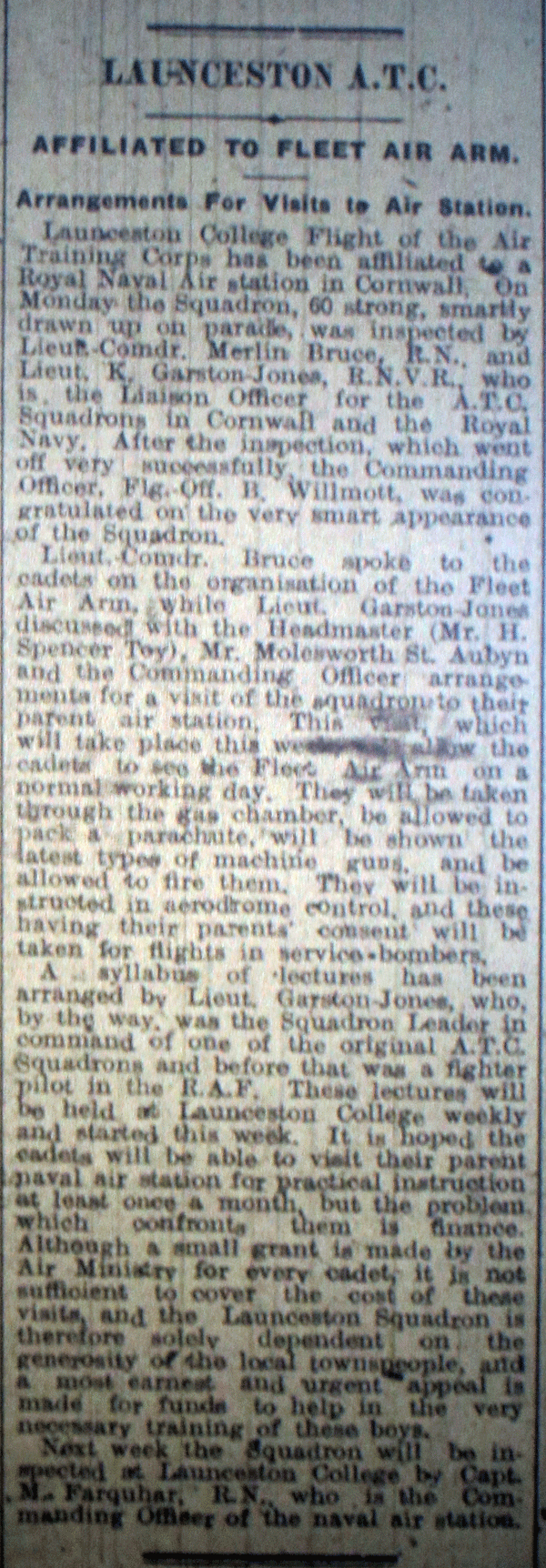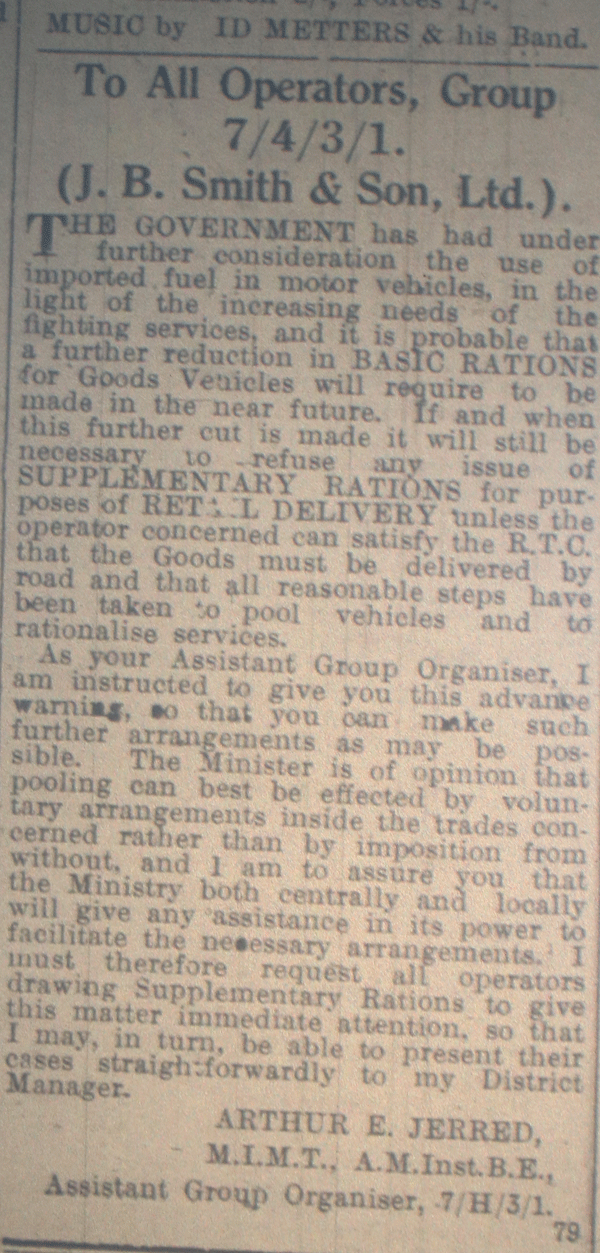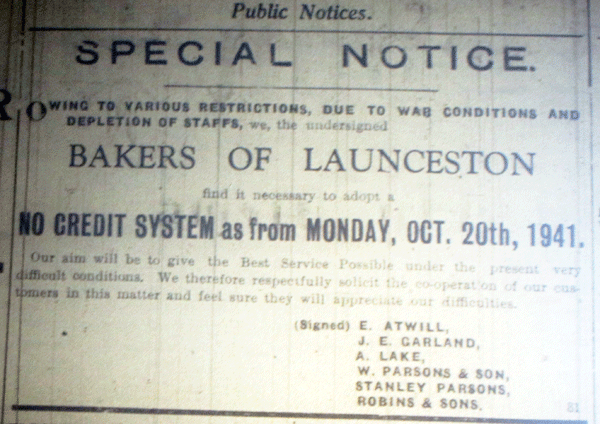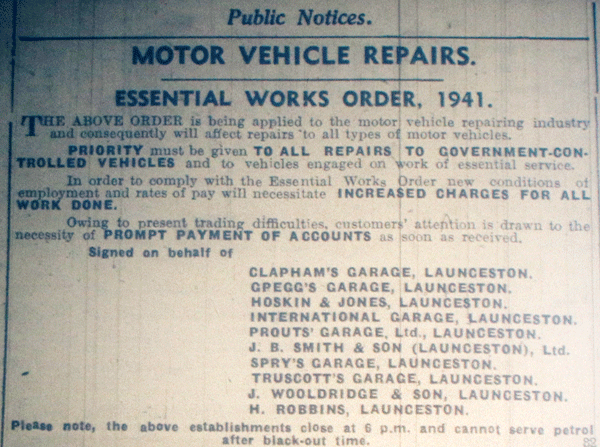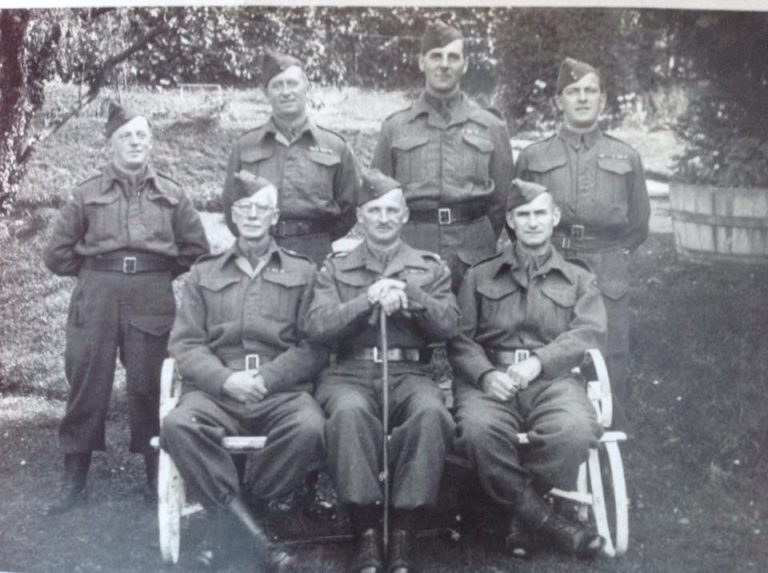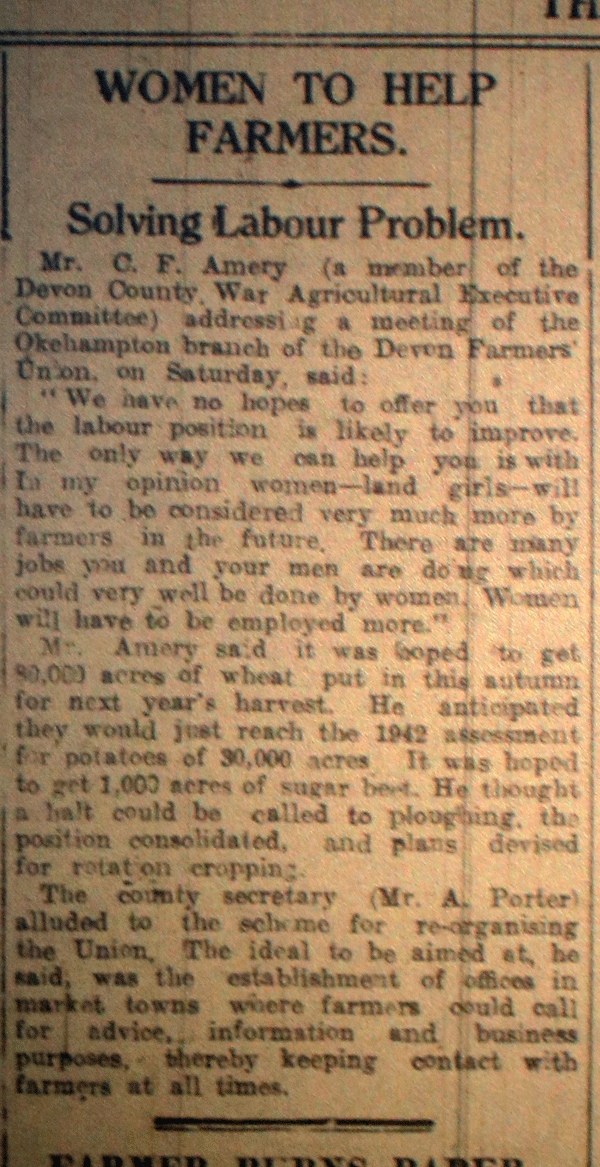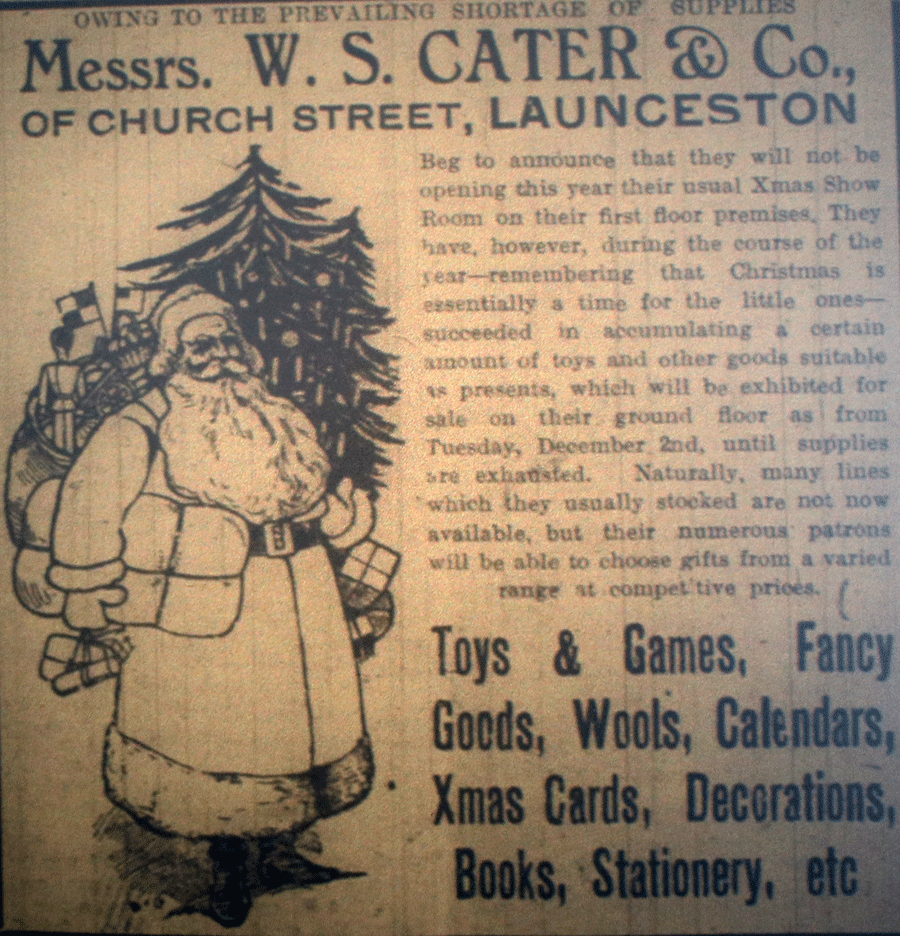.
At the first Town Council meeting of the year, held on January 20th, the minute of the Fire Brigade Committee on the motion by Councillor Fitze and seconded by Alderman Trood, it was recommended that a ‘new motor fire engine be purchased,’ drew a debate to which the Mayor advised the Council to wait until the Town Clerk had received a reply from the Ministry with reference to the Council’s inquiry as to whether a grant would be available. Councillor Fitze said the Committee had made the recommendation because of the present situation (the war). He said that the Brigade had to answer calls from bigger towns set ablaze by enemy action (Plymouth), and while the present engine did its work locally, it was not satisfactory for long journeys. Councillor W. H. Gilbert enquired whether it was possible to put the present engine into a satisfactory condition to which Alderman J. Harvey replied that the engine was not trustworthy to go long distances. Councillor T. Hicks (Chairman of the Committee) pointed out that they wanted to cut their losses. The necessity had arisen because of the war. While the country was spending money on machines of destruction, he did not think they ought to stop long to consider spending money to provide for the preservation of life and property. On one occasion when their engine had been called to help a town attacked by the enemy, the engine broke down three times on its way there. Councillor Miller (also Captain of the Fire Services), pointed out that when the engine was purchased there was no question of its being driven as hard as possible to fight fires caused by an enemy. He stated that he was ready to do all he could to keep the present engine on the road, but he felt it was his duty to put the facts before the Committee. He feared that if they had a complete breakdown, Launceston would be without an engine. He concluded that a new engine could be supplied at a cost of £1,000, in about 14 weeks. It was agreed to await the Ministry’s reply before proceeding any further on the matter. At the following meeting, the Town Clerk reported that as a result of Councillor Miller’s visit to London and meeting with officials of the Home Office (Fire Brigades Division) he had received a letter from the Secretary of the Home Office dated March 27th, 1941, stating that he was prepared to recommend to the Minister of Health that sanction be given to the loan necessary for the purchase of a John Kerr Drysdale Fire Engine at a cost of £1,275.
Councillor Miller then told the meeting that 200 people had volunteered to form fire parties, and some were actually on duty. He said that he was continually receiving inquiries from householders about the supplies of sand, and he suggested that sites for dumps be found. He reported that some parties had been so enterprising as to share the expense of providing ladders, and to order helmets. The public had shown good spirit and he did not think there would be the slightest need for compulsion. It was decided to obtain supplies of sand, and to deliver bags to each house. On the suggestion of Councillor Fitze, it was decided to make an application for free provision of helmets for volunteers. It was the Government’s scheme, and workers could not be expected to climb on roofs without protection, he added. Councillor Philp said he had received complaints that the siren could not be heard by residents in Tavistock Road. Councillor Miller added that the Fire Brigade had received complaints to the score. The Town Clerk (Stuart Peter) reported that sanction had been given for fixing of another sire at Page’s Cross, but it was feared it would cause distress to the patients at the hospital. Dr Galbraith suggested that the siren should be sounded for two minutes instead of one. It was agreed to experiment with another siren.
On the night of January 13th, the Luftwaffe performed a heavy raid on Plymouth. This was the first of five raids in early 1941 which reduced much of the city to rubble. Attacks continued as late as May 1944 with two minor air raids in that month. During the 59 bombing attacks, 1,172 civilians were killed and 4,448 injured.
By the beginning of February, a scheme to divide Launceston into a series of fire-watching areas was discussed at meetings held in the Town Hall. Captain Miller of the Fire Brigade, stated that he had tried with the A.F.S., to organise the town into island blocks, and get a number of people to act as fire-watchers, and they wanted some of those fire-watchers to go a step further and train as firefighters. Enrolment forms were provided, and when people had enrolled they would be allocated to their own district and be given particulars as to what was expected of them. One person in each area would be asked to organise and draw up a rota, which would make the working reasonable and easy. In the centre of the town, where there were island blocks, they would easily get sufficient people to look after the premises adequately. They wanted fire-watchers, not only to see where the bombs dropped, but to deal with them at once, and by having a number of watchers they would be able to go to each other’s assistance. Each block would make sure that there was a ladder at hand to enable the fire-fighters to deal with bombs which did not penetrate into the building. It was envisaged that fire-watchers would only go on duty when the siren sounded, but if attacks became frequent it might be necessary for that arrangement to be extended.
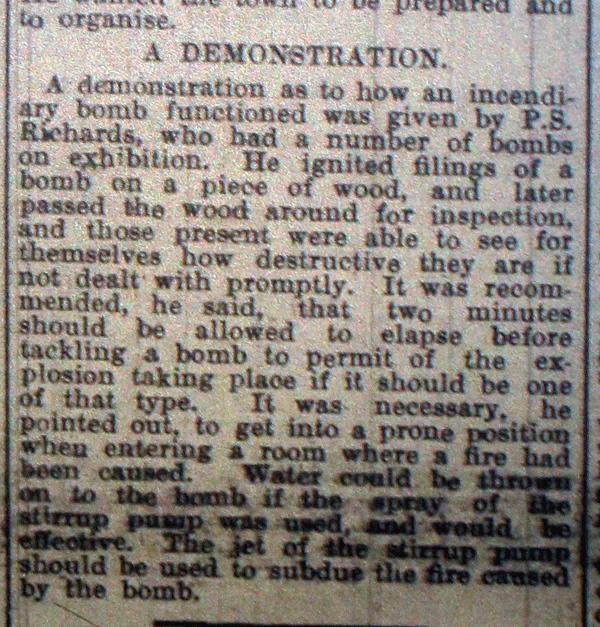
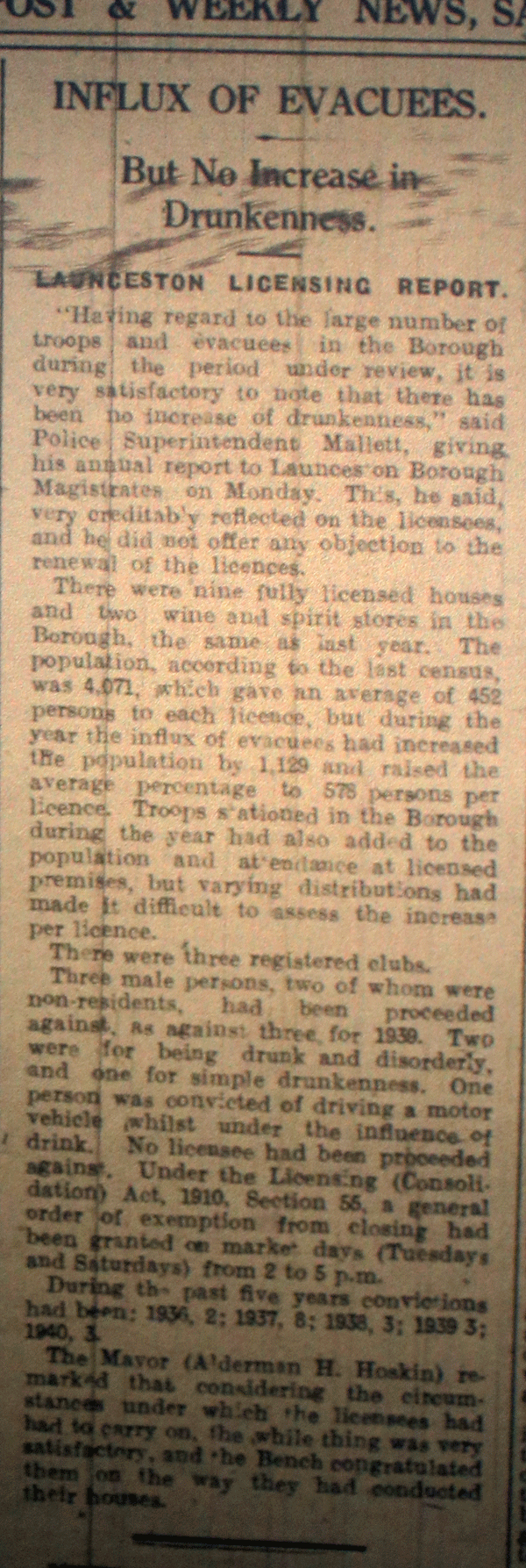
Stoke Climsland had a visit from an enemy raider on March 21st, 1941, when two high-explosives were dropped about one mile south of the village, but without causing damage.
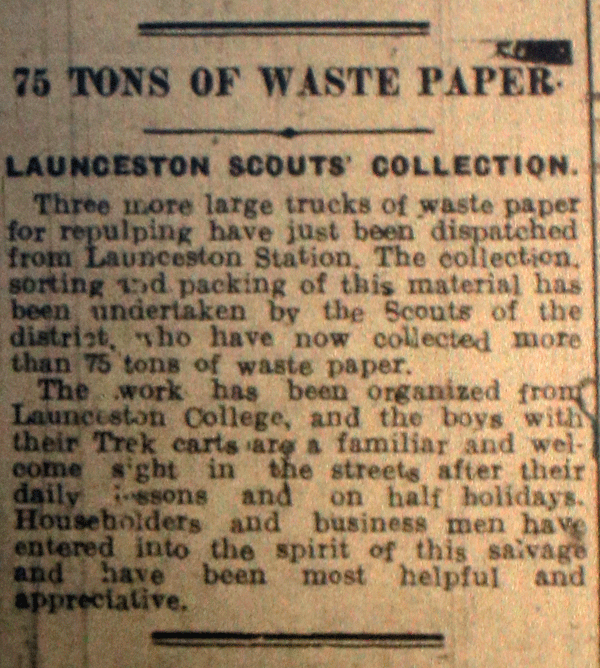
Charles Friend, 2, Dutson Terrace, Launceston, 15s.; Arthur Batten, 2a, Station Road, Launceston, 15s. (caused by a fire in the room); William Horwood Nute, 1, The Walk, Launceston, 15s.; Alonso Studden, Bank House, Westgate Street, Launceston, 10s. and Doreen Elsie Ellacott of the same address, £1; Miss Elizabeth Ann Martin, 15, Westgate Street, Launceston, £1; Ernest Edwards, Southgate Place, Launceston, £1.
The subject of overcrowded billets for evacuee’s was discussed at the monthly Town Council meeting held on Monday, April 21st, after the Town Clerk read out a letter from the Ministry of Health drawing the Council’s attention to the fact that the Council should exercise its powers where extortionate rents were being charged in their area, more particularly in regard to furnished lettings. Councillor T. Hicks said he took it that the more people who crowded into small rooms, the more money was obtained by the householder. He knew of one small room where a mother and two children lived and slept, and that room was making 11s. a week. He said, “the mother had arranged an orange box in which to keep her food.” “For another small cottage, in which were a mother and four children, 17s. per week was charged, and it was not worth more than 5s. per week. If the Ministry were asking them to look into one side of the question, the Council should also look into the other,” he added. The Medical Officer of Health (Dr Galbraith) asked for the particulars of the first case mentioned. Later in the meeting, Councillor Hicks said that after looking over the accounts, he had noticed that the billeting officer’s costs had doubled since the scheme was first set in motion. He asked why was the voluntary staff dismissed, and a paid staff installed? “There was no department being more criticised in the town,” He said, adding that in the beginning the Billeting Committee were given the power to act, and the thing had developed in a way not expected. All other committees before passing matters had to submit them to the Council, and that in regard to billeting should be sanctioned by the whole Council. The Mayor and Town Clerk confirmed that the expenditure was sanctioned and paid for by the Ministry. Councillor Fitze proposed that the Town Clerk provide the figures as to the amount of work done and the amount spent. He said “the committee had nothing to hide. If people realised the amount of work being done they would know that voluntary labour could not do it.”
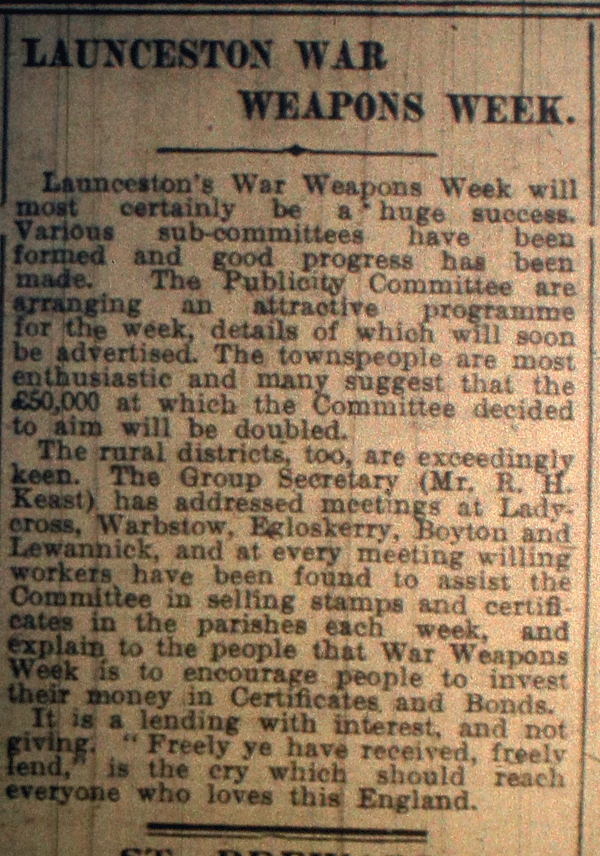
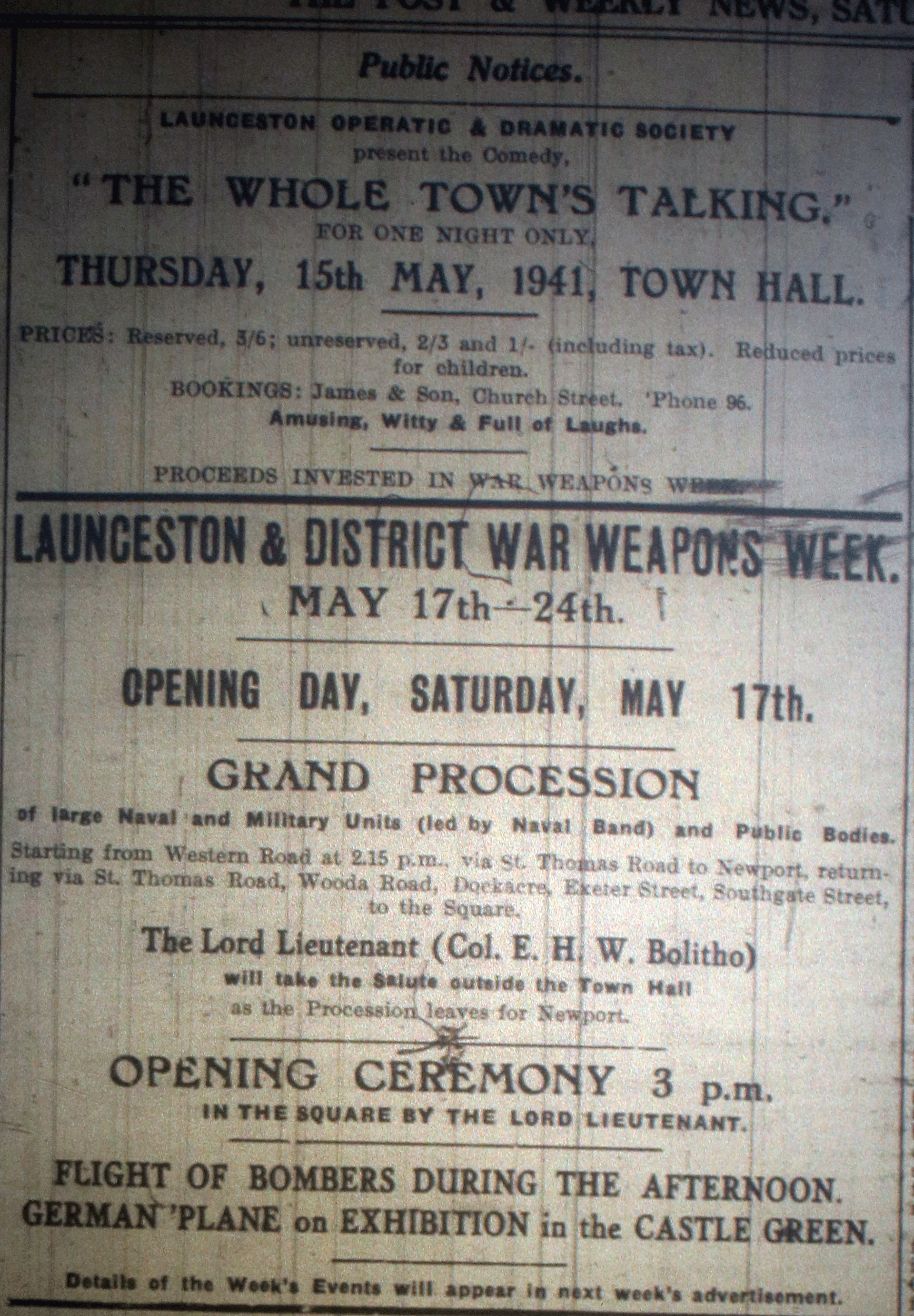


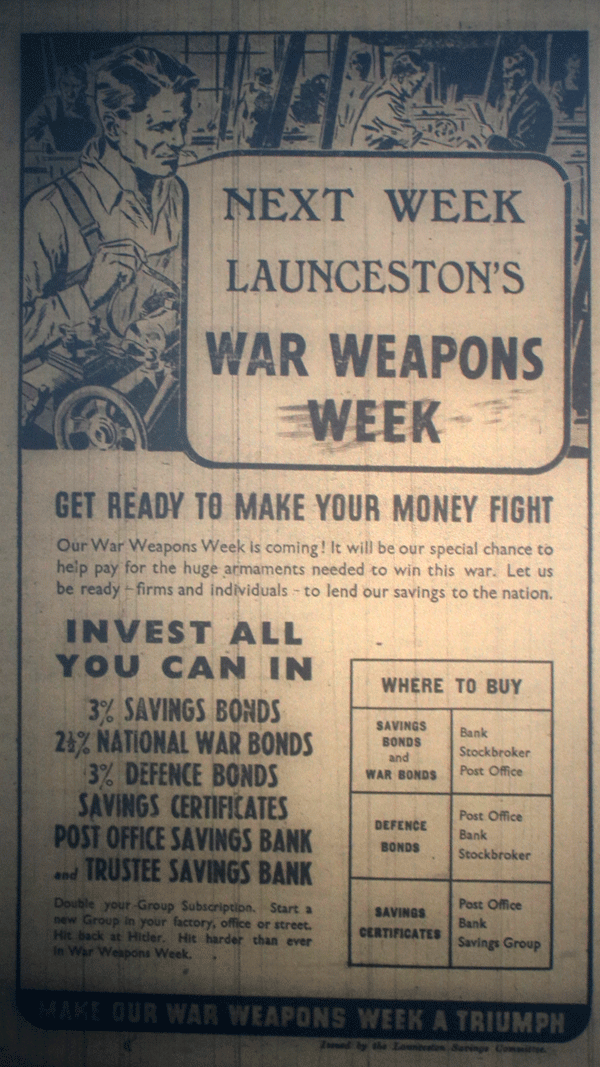
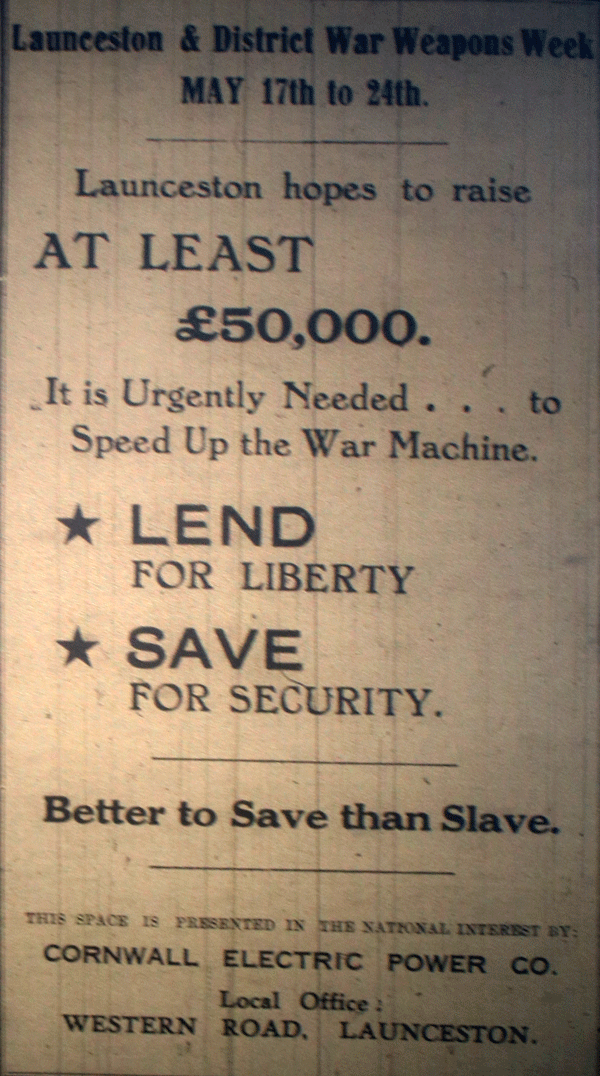
It was announced in April that Launceston would hold a War Weapons Fund Raising Week for May 17th to 24th, with the aim of raising £50,000 by means of investments in War Loan, Defense Bonds, by the purchase of Savings Certificates, and deposits in Savings Banks. The week was opened in the Square by the Lord Lieutenant of Cornwall, Col. E. H. W. Bolitho, at 3 p.m. on Saturday, May 17th. One of the main displays was a German ‘plane exhibited on the Castle Green for the first part of the week. The week began with a parade around the town led by a Royal Marine band and a large Naval contingent and Wrens from Plymouth, the long procession consisted of a military unit; members of the Castle Battalion Home Guard and the Railway Home Guard, under Captain R. Prout; Royal Observer Corps, under Mr J. H. Lashbrook, Head Observer; Ambulance Brigade, under Supt. R. Heard and Ambulance Officer W. G. Mooney, with the M.O.H., Dr Galbraith; Launceston Detachment Red Cross, and some members of Egloskerry and Altarnun Detachments, under Mrs Galbraith, commandant and vice-president for East Cornwall; A.R.P. Wardens and Control Centre Staff, under Mr W. Cater, divisional warden; ambulance attendants; Rescue Squad, under Mr C. H. Chapman; Decontamination Squad, under Mr T. A. Judd; A.R.P. Messengers, under Mr R. S. Prout; Launceston College Scouts and Launceston Town Scouts, under the District Commissioner, Mr H. Toy, G.S.M. G Sloane, and A.S.M.s K. Sheldon and A. M. Sowden; 3rd Launceston Guides, under Miss J. Jones; 1st Launceston Rangers and Pendruccombe Guides, under Miss L. H. Chambers. R.S.M. F. B. Bryant marshalled the procession. The Lord-Lieutenant took the salute as the march passed the Guildhall, where the Mayor and Corporation and officials had gathered and the procession, which had assembled in Dunheved Road, then proceeded via St. Thomas Road, Wooda Road, Dockacre Road, Tavistock Road, Race Hill, Southgate Street, to the Square, which, apart from the space allotted to the procession, was crowded with people. Businesses had closed for the procession, allowing their staff to also attend. The procession came to a halt and took up their respective positions in the Square Where the Mayor before introducing Col. Bolitho, read a telegram from the King who “sincerely thanked the inhabitants of the Royal Borough of Launceston and the adjoining district for their loyal greetings on the opening of their War Weapons Week, to which His Majesty wishes every success.” Two further telegrams were read out one from Sir Kingsley Wood, and another from Mr Harwood, Regional Commissioner South West. The Mayor then said it was his privilege some time ago to appeal to the people of Launceston to give to a Spitfire Fund, and they gave liberally and made it a great success. Now he was not appealing to them to give; he was appealing to them to invest their money, which meant that it would be an advantage to them to place their money at the disposal of the Nation. “It will help the Nation whilst you yourselves are being helped,” he said. The Mayor then welcomed and introduced the Lord Lieutenant. Pointing at a Fund Indicator situated outside the White Hart Hotel, he said, “look at it there, it is for £50,000, and the indicator goes to £65,000. What is the good of that? That £65,000 is no good; it will go up to the top of the White Hart Hotel, right up to this roof. I am asking you to get £200,000, but, it is up to you to make a real effort. Just think of what you have seen today. You have seen men of the Royal Navy, members of the Wrens, the Regular Forces, the Home Guard, and other Services marching past in your historic town. This town has seen many great and stirring events, as it would do, being the gateway to Cornwall. But there have been a few things more stirring than the parade you are seeing today.” He continued on, mentioning the visit in December 1937 of King George amongst other things, finally concluding “it is up to you, and I feel sure you will do it.” Proposing a vote of thanks to the Lord Lieutenant, Colonel Norman Colville of Penheale Manor, said they had been asked to raise the figure to the roof of the White Hart Hotel, but he was going to ask them to raise it on the roof. Col. Colville appealed to farmers to invest, and addressing the various Services, said they must pull together to start to win this war. If they did not combine straight away if they did not think of better days ahead, what had they to live for? They might have to face stern days; they might face defeat and difficulties, but if they pulled together and did their little bit, however small, they would come through. When they had enough guns, etc., and collected enough money, they were going to start to win this war and pull pieced that gigantic and barbaric force which was Germany. They must make sacrifices. It was up to the people of Launceston and the country district around to pull together and make their War Weapons Week a success.
An arrangement for a flight of bombers to fly past and drop leaflets during the opening was postponed due to operational needs. So successful were the first few days of the week that the target of £50,000 was soon passed, and a new target of £100,000 was then set. On the Saturday alone £33,001 was raised and by the Thursday the figure stood at £85,359. The drumhead services on the Sunday was a great success, and the ‘Divisional Concert’ on the Monday drew a crowded house, as did also the performance by the Launceston Amateur Dramatic Society, on the Tuesday, when they produced ‘That Whole Town’s Talking.’ The Divisional Concert was an Army revue, ‘Rhythm Cocktail,’ and the party consisted of West End artistes who were then in the Forces. The show, compared by Busty Sullivan (a well know London comedian of the time), began with ‘a musical tour of the world’ by the band, the Rhythm Rascals, with Benny Lee at the drums, Jackie Bollom, tenor saxophone, Dennis Ringlow, accordion, Jack Avery, alto saxophone and clarinet, Jack Artis pianist and Syd Jeffery, double bass. Freddie Carlisle amused the audience with his impersonations of the famous of that time including President Roosevelt and Lord Haw-Haw. A classical touch was added by the pianist Chris Hall, who played a selection of waltzes and Schubert’s ‘Marche Militaire.’
At the beginning of July, a Launceston Red Cross ‘Penny-a-week’ fund was started, with a weekly house to house collection being made to provide funds to the Red Cross. The object was to ensure a regular income for the Red Cross and it was estimated that throughout the country some £4 million per year would be sourced.
On July 9th, 1941, three high-explosives fell in a field owned by Mr Polkinghorne at Larrick, Lezant, and four fell on Trekelland Farm in the occupation of Mr Jenkin. No damage was caused on either properties.
A new scrap metal scheme was inaugurated by the Ministry of Supply on July 12th, in an effort to augment the supply of scrap metal for munitions. With this in mind, an appeal was sent out to farmers by the Lord Lieutenant of Cornwall, pointing out that scrap metal had never been needed in such vast quantities as at that time. He said that there were thousands of tons of old agricultural machinery lying about in the county, which would prove invaluable for the war effort. Farmers were asked to collect scrap at a convenient place in their yards or adjacent to a hard road. There was also the ability to if they so desired, to donate to the British Red Cross Agricultural Fund, or sell it at a flat rate of £1 per tone. It was hoped that the appeal would see 4,000 in Cornwall within three months.
At the August Town Council Meeting, the problems of hearing the siren was again raised. Complaints were made that the siren could not be heard in certain parts of the town that some civil defence workers who were keen on their jobs did not turn up, and that others mistaking the ‘All clear’ for the ‘Alert’ sometimes turned out and remained out waiting for the ‘All clear.’ The problem area centered yet again around the area of Page’s Cross, or more directly this time at Race Hill and Bush Park. Councillor Gilbert noted that the temporary siren was no longer in situ. The Town Clerk replied that during the last winter they had tried the temporary siren which was in effect just a horn, but that it did not prove satisfactory and was removed. He said that the County authorities had been asked whether it would be possible to procure another siren, but they were difficult to get, and were very expensive, costing about £70. Councillor Miller observed that the range of the present siren was four miles. It had been found by experiments that the highest position was not always the best. Councillor Philp said the range of the present siren was sufficient, saying that it could be heard at Coads Green, yet with certain wind conditions , he could not hear it from his own office in the town. Others said that Lifton and as far a field as Canworthy Water could hear it. It was suggested trying out the siren in another position to see if that alleviated the problem.
Also at this meeting, the matter of the approaching winter in regard to the coal situation was raised, where Councillor Miller had noted that it was rather alarming that the town was without any stocks whatsoever. The Mayor asked, “if that is the position now, what will it be like in the winter?” On the motion of Councillor Fitze, and seconded by Councillor Miller, it was decided to write the authorities pointing out the seriousness of the position. With reference to the Ministry’s communication as to the disposal of iron railings, it was explained that the Council had none which could be removed, the Surveyor remarking that scrap iron had been accumulating and would shortly be disposed of.
The following month the question of waste materials was again raised at the monthly Town Council Meeting. The matter arose on the receipt of a letter from the Ministry of Supply, stating that a complaint had been received that for a considerable time the Council had been dumping all kinds of salvage into a deep disused pit partially filled with water, and that such salvage included metals of all description, waste paper, etc. The letter pointed out the Council’s salvage returns for several months past had been extremely disappointing in view of the urgent need for an intensified collection of waste paper, which was now a munition of war. The quota for these materials was 1 ton of waste paper per 1,000 of the population per month, and 10 cwt of metal. The Council appeared to have done nothing at all with regard to the collection of bones.
The Town Clerk said he had replied pointing out that the complaint in the first part of the letter was without foundation. Since the receipt of the Direction a house-to-house collection of the materials mentioned (other than bones) had been in force each fortnight, and all materials, other than paper, had been taken to the quarry referred to. Here a man was detailed to sort tins and ferrous and non-ferrous metals, and the residue – broken bottles, etc. – deposited in the quarry. Bones had been collected once weekly, and returns made, and the payment made for those sent away. The disused quarry had been the Council’s refuse tip for twenty years, and there was a large accumulation of material dumped there prior to the Direction. The Council had done all possible by publicity to make the salvage scheme a success. The Surveyor said the only unsatisfactory part of the scheme was in regard to waste paper. Replying to Councillor Philp, the Surveyor said he had asked shopkeepers to arrange their own transport of paper to the Cattle Market, where the paper was dealt with. They were not getting all the paper they should from the shops. Their weakness was transport, and they looked to traders to co-operate in that matter as far as possible. Alderman J. Harvey said many people who did not realise the value of paper, put it in their dust bins, and Councillor Uglow remarked that as much new paper was not now available, people were using up second-hand paper, which should, however, eventually find its way to salvage. Councillor Philp pointed out that traders had difficulties with transport owing to depleted staffs, and the Surveyor said he proposed to go to each shop and find out the difficulties. If the traders could not supply their own transport, the Council must do it. Councillor Gilbert remarked that householders had less paper coming in, and there was consequently less to go out. When the appeals were made for paper, many people cleared out their stores. Councillor Hicks considered there should be depots for other parts of the town, but the Mayor said it boiled down to one thing – they must be prepared to make a little more sacrifice. The press had done their best to give publicity to the need for salvage. The Mayor congratulated the Town Clerk on his reply to the Ministry. It was difficult to reply to a complaint when one did not know whether the writer was prejudiced or not. The Deputy-Mayor, Councillor Gregg, said: “some Nosey Parker who would be better employed doing war work.”
Alderman Harvey said that the Boy Scouts were still collecting paper, but he did not know whether the amount was included in the Council’s returns. The Surveyor said that officially they had given up, but unofficially he still saw them going around.
The Town Clerk also read a letter from the Ministry of Supply asking that a survey be made of railings, etc., in the town, and it was decided that the Surveyor should make a survey. Councillor Hicks enquired whether it was a fact that there were many tons of scrap iron at the brick works at Dutson, but the Mayor pointed out that that was in the rural area. Councillor Uglow expressed surprise that they were asked to make a survey of railings when there were dumps which had not yet been cleared, and Councillor Hicks said there were, hundreds of tons of metal lying about the countryside. Councillor Fitze said the Council concern was in regard to the Borough. Was there any scarp in the town? The Surveyor said there was no doubt that there was metal in the town, and if people would only put it out it would be collected.
It was also at this meeting that the Council were informed of a letter from the Home Office, who were suggesting to wholesale disappointment, that as little work had yet been made on the new fire engine for Launceston, the order should be suspended for the duration of the war. Councillor Miller stated that he had received three letters from the firm making it, saying that the construction was doing well, with the last one they stating that they would hope to soon give a definite delivery date. Now the Council were learning that very little work had been commenced on it, leaving Councillor Miller to say he would think twice before placing an order with a firm who treated them in that way. The Deputy-Mayor remarked that the firm had more or less “led them up the garden path.” In view of the letter read that day he thought they were entitled to an explanation. Councillor Miller stated that he hoped to meet a representative of the Fire Services that week to find out how things stood.
Japan launched a surprise attack on Pearl Harbor on December 7th, and declares war on the United States and the United Kingdom and invades Thailand and British Malaya and launches aerial attacks against Guam, Hong Kong, the Philippines, Shanghai, Singapore and Wake Island. Canada declares war on Japan. Australia declares war on Japan. The following day the United States, the United Kingdom, the Netherlands and New Zealand declare war on Japan. On what would prove to be a turning point of the war Germany and Italy declare war on the United States on December 11th. The United States reciprocates and declares war on Germany and Italy. The move would prove to have a monumental effect and direction of the war, with the might of the United States manpower and manufacturing now firmly behind the Allies, the ramifications for the Axis powers would soon be experienced. The entry of the United States into the war would also have a big impact on Launceston during and after 1942 with the influx of US army service men that were billeted at Scarne cross No. 406 (mainly administration) and Pennygillam No. 257 (living quarters). These camps were already in existence on a temporary base due to their original use for evacuees.
On Friday, December 12th, the general public were shown a ‘peep behind the scenes,’ when a display unit of the Red Cross and St. John Ambulance War Organisation visited Launceston. The six vehicles, parked in the Square, included the ‘Prisoner of War Van,’ where there were parcels of food, clothing and other gifts which were being sent out to British men; an ‘Aid to Russia’ van, displaying medical supplies, and also a large number of photographs; the Mobile Canteen van, which could be rushed up to a blitzed area with supplies of hot food and drink; and the Mobile X-Ray Unit and the glass-sided physiotherapy van, containing the most advanced instruments of the time. The visit had been arranged due in recognition of the West Countries generous contributions to the Red Cross Fund. Just before Christmas, the Government announced that the 10,000 agricultural workers already selected for military service, must be released for the Forces. The Minister of Agriculture, Mr R. S. Hudson, speaking to the Council of Agriculture, said, “These young men have been selected with the greatest care as being those whom we can least ill afford to lose.” Immediate steps were to be taken by farmers affected to endeavour to replace these men by members of the Women’s Land Army and to train the women as quickly as possible. The call up was confined to selected men who were under 25 on registration. The greater majority of men under 25 would not be disturbed, as they were badly needed on their present farms, he concluded.
Visits: 97

